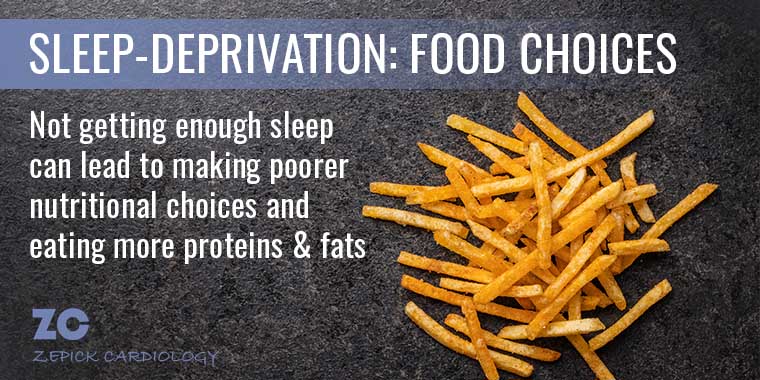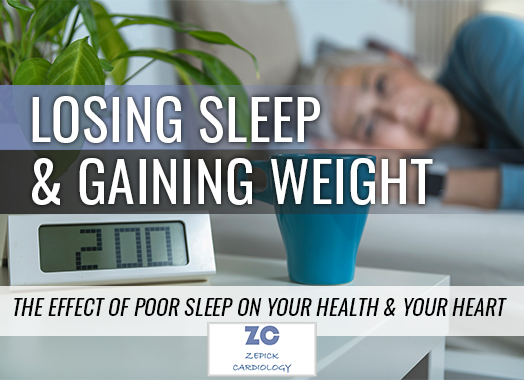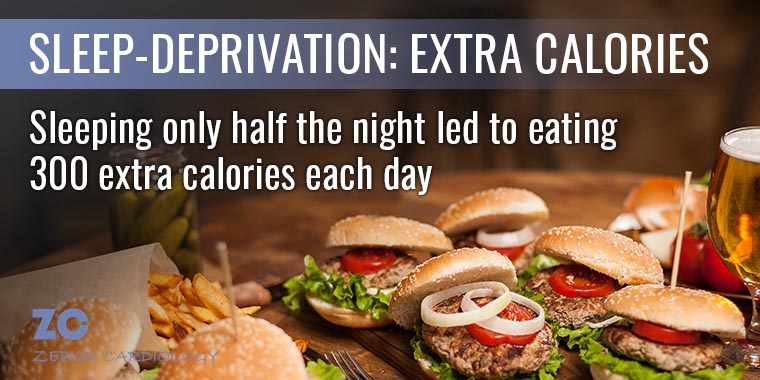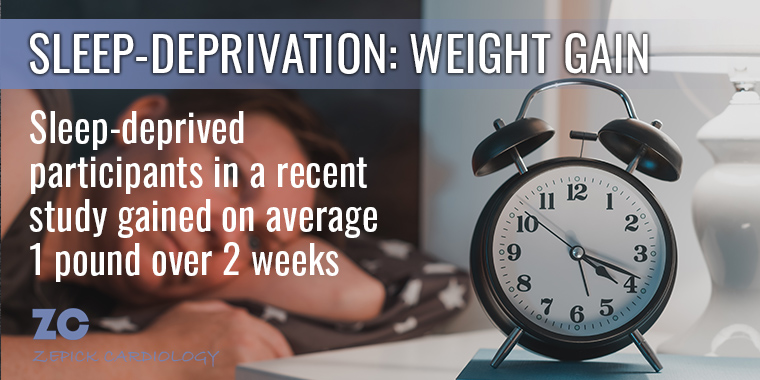New Research Proves Poor Sleep Increases Weight & Risks to Your Heart Health
Not getting enough sleep is a common problem for Americans. In fact, more than a third of the U.S. adult population does not get an adequate amount of sleep.
You may have heard that not getting proper sleep can lead to weight gain, but what does the science say? New research has found a substantive link between sleep loss, weight gain, and increased risks to your heart.
At Zepick Cardiology, we know the importance of good health habits. There are many factors that increase your risk for cardiovascular disease including weight gain and obesity. Identifying what is putting someone’s heart health at risk helps us provide complete care for our patients. With this new sleep research, we can better understand how sleep plays a role in heart disease and create strategies for improving our patients’ health.
Effects of Being Awake Half the Night
What happens if you only get a half night’s sleep for two weeks? Will that make you gain weight? That’s what a study that recently concluded sought to find out.
Participants were limited to getting only 4 hours of sleep. Over two weeks, researchers tracked their body composition and what they ate. Would they eat the same amount of food as a control group? Would they eat more?
The answer was clear. The group who got only four hours of sleep each night increased how many calories they consumed compared to the group getting a full night’s sleep.
People who had a poor night’s sleep ate on average 300 calories more each day. To put that in context to weight gain, if consuming 3500 calories equals one pound of weight gain, a person eating an extra 300 calories daily would gain one pound about every 12 days. After a year of this, they would gain about 30 pounds.
What We Eat When We Are Sleep Deprived
These participants weren’t just eating more calories, the foods they chose were less nutritious.
This 4-hour sleep group primarily opted for foods higher in protein and fat. While both are important parts of a healthy diet, eating too many fatty meats and cheeses can exacerbate your risk for heart disease.
Research shows the best diet for optimum heart health is a Pesco-Mediterranean Diet.
Sleeplessness: More Than Just Weight Gain
Simply gaining a few pounds is not a big problem. But where you gain fat can be.
In this sleep study, people who didn’t get enough sleep typically gained about a pound over the two weeks. Researchers looked specifically to determine what kind of weight gain is created by a loss of sleep.
For healthy individuals, overeating primarily causes more subcutaneous fat, the fat found under the skin. But the participants getting a half night’s sleep saw fat growth of a different kind, an increase in their visceral fat. Visceral fat is located between your internal organs. This is a particularly problematic fat as it hurts your health more than fat located elsewhere in the body.
Having more visceral fat puts you at greater risk for certain health problems such as heart disease, type 2 diabetes, and stroke.
A small increase in fat was found in some people in the control group getting a good night’s sleep. However, it was not an increase in visceral fat. This finding further supports the link between sleep loss and visceral fat gain.

Slept Bad Last Night? Skip the French Fries Today
Millions of Americans struggle with getting sufficient sleep. However, you can help combat the risk of increasing dangerous fat during these sleepless nights by being proactive.
This new research shows you are more likely to consume an extra 300 calories or so during this time. With this knowledge, you can take steps to control your food intake around these sleepless nights.
If you have been suffering from a bout of sleeplessness, make efforts to consume a typical day’s meals during this time. Make smart, nutritional choices like avoiding high-fat foods.
The recommendation for a good night’s sleep is 7-9 hours. But can you just catch up on your sleep over the weekend? Unfortunately, no. Even after the sleep-deprived participants got three nights of “recovery sleep,” there was no change to their visceral fat deposition.
Conclusion
Sleep loss does lead to weight gain.
The research concluded that sleep restriction leads to significant weight gain. The participants who only were given the opportunity to sleep for four hours each night gained an average of 1 pound over the two-week study.
But the real risks of sleep loss can’t be measured with your bathroom scale. A significant finding in this study was the type of fat that sleeplessness leads to. The research’s focus on body composition provides data that shows fat gained by sleep-deprived people is the more dangerous kind. They saw an increase in the kind of fat that more directly affects your risk for health problems including cardiovascular issues.
More research can provide further insight into the harmful effects of sleep loss. But with this current research, we now have the first causal evidence that links short sleep to increased abdominal obesity and visceral fat.
If you would like an appointment with a Wichita cardiologist or have questions about your heart health, call Zepick Cardiology in Wichita at (316) 616-2020.







